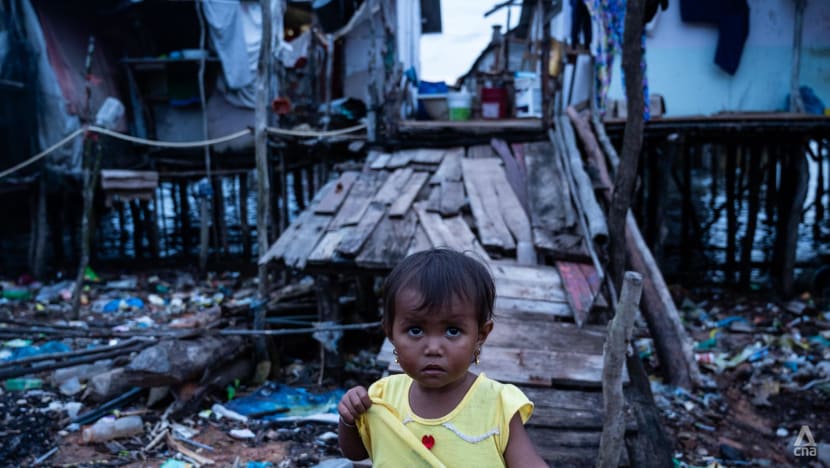'Way of life at risk': Under threat from climate change, Batam's sea people face an uncertain future
For centuries, the seafaring nomads have roamed the Malacca Strait, spending virtually their entire lives on traditional boats. But pollution, rising waves and competition from more advanced fishermen have upended the lives of Orang Laut, some of whom turn to be rubbish pickers on land.
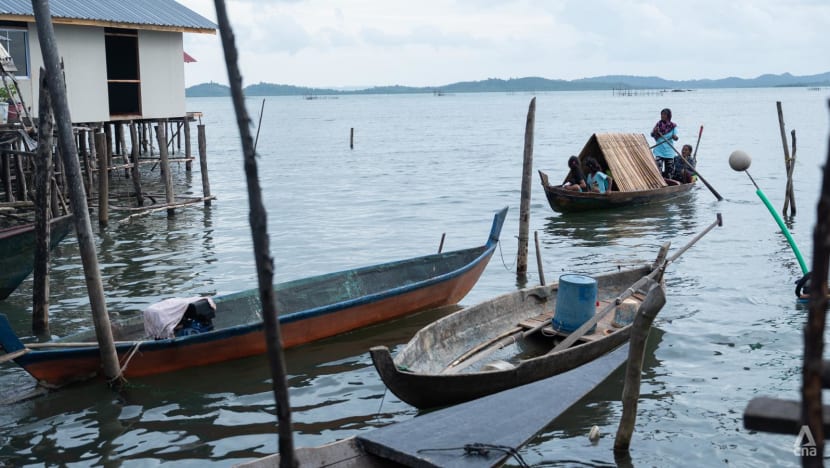
A family of Orang Laut sea nomads return to their village in Gundap, Batam, Indonesia after sailing nearby waters. (Photo: CNA/Wisnu Agung Prasetyo)

This audio is generated by an AI tool.
BATAM, Indonesia: As rubbish-strewn waves crashed beneath his tiny, wooden stilt house, Mr Saiyun carefully took his most prized possession from a high shelf and placed it on the floor for all to see.
In his frail, ageing hands was something he had meticulously handcrafted over many months, a miniature version of the traditional rowboats used by his people, the Orang Laut - the sea nomads who roam the Malacca Strait and the waters off the eastern coast of Sumatra, Indonesia.
“We did everything at sea,” Mr Saiyun, who like many Indonesians goes by one name, told CNA at his home in the southwestern part of Batam, Indonesia. “We were born at sea. We raised our children at sea. We even had weddings at sea.”
The 60-year-old wanted to show what life was like in his younger years, when the Orang Laut of Indonesia’s Riau Island province used to row their boats all year round, travelling from one island to the next depending on the seasonal winds as well as fish migration patterns.
They packed everything they had inside these 2m wide and 6m long rowboats: Utensils, cookwares and mattresses.
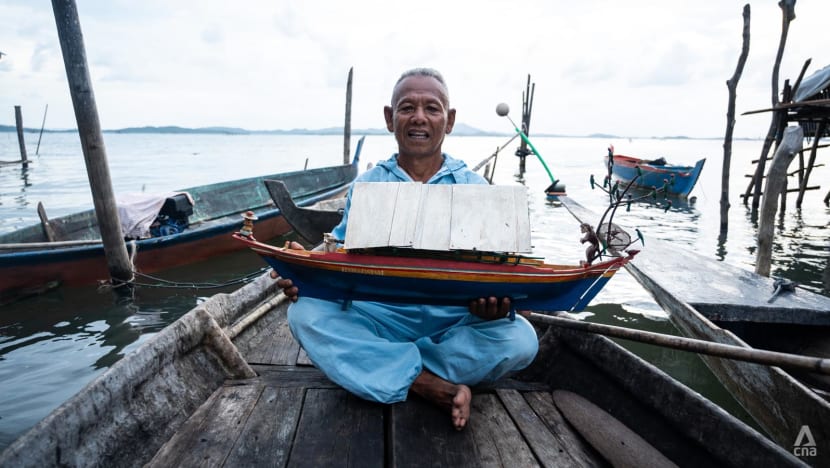
He explained that a single boat like the one represented by his model could fit two adults and two young children. When they reached adolescence these children were given their own “child boats”, which are tugged along by the main boat using a hemp rope.
When couples wed, they built their own main boats and ventured out to sea on their own.
“This is where I would keep my dog,” Mr Saiyun said, pointing to a white figurine with its face turning to the port side of the boat’s bow. The dog’s face was sculpted to look alert as if watching for signs of sudden weather changes and pirates.
Mr Saiyun’s eyes lit up as he showed CNA other features of his arm-length miniature: Retractable bamboo roofs which can stand upright and act as sails, various fishing gears like nets, spears and hooks to catch different types of fish, and scaled-down versions of his pet monkey and exotic birds.
He felt it was imperative to replicate every small detail of his rowboat, which was wrecked by a storm some 10 years back, to show people how Orang Laut of the past once lived.
Up until around two or three decades ago, people like Mr Saiyun would spend their entire lives at sea, setting foot on land only to seek refuge from heavy storms, look for fresh water, cut down trees to build boats, and bury the dead.
But rowboats, which go by various names according to the myriad of dialects spoken by the ethnic group, are fast becoming a thing of the past.
Pollution, competition from more advanced fishermen and climate change mean the Orang Laut in Batam are spending less time at sea, their catch dwindling, forcing some to work on land. With no education, scavenging is often the only work they can find.
As waves become bigger and the wind stronger, the sea is becoming an increasingly hostile place for Orang Laut, unsuited to their nomadic lifestyle.
Although some still go on long sea expeditions for four to five months a year, virtually all the Orang Laut have now become sedentary, residing in stilt houses on the coastal areas and small islands of Riau Islands province.
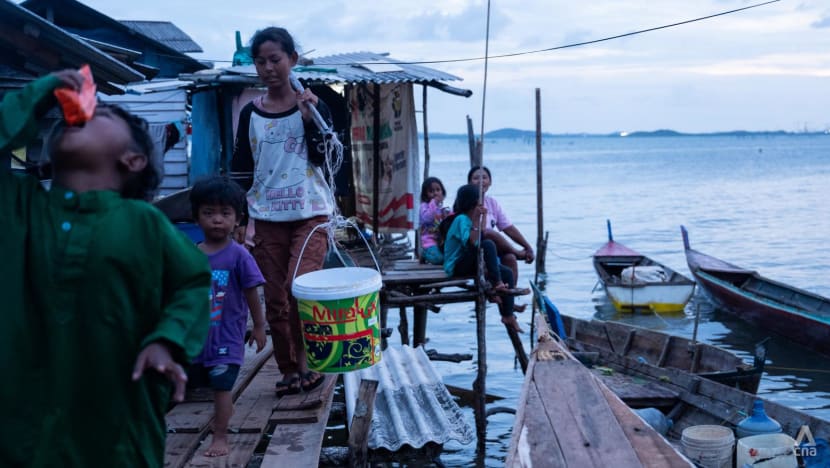
In the view of some Orang Laut interviewed by CNA, the only way to cope with the increasingly unpredictable weather pattern is to use machine-powered fibreglass boats like those used by modern fishermen or abandon the sea altogether and look for work on land.
“Their way of life is at risk,” Dr Wengky Ariando, a research fellow at the Indonesian Research and Innovation Agency (BRIN) told CNA.
CLIMATE CHANGE
For more than a thousand years, Orang Laut have roamed the waters of Sumatra, Singapore and Western Malaysia with some historical texts suggesting that their existence predates the founding of Sumatra’s Srivijaya Kingdom in the 7th century.
Indonesia’s Riau Islands are home to the largest population of Orang Laut, estimated to be at least 12,000 people in the province alone, while those in other areas have largely been assimilated into the local Malay population.
In Riau Islands, they are distinguishable from ordinary fishermen in the province by the use of retractable bamboo roofs on their boats, known in some Orang Laut dialects as “kajang”.
Related:
Mr Hasan, 43, a local fisherman, said when he was young he would often take part in a convoy of sea nomads, travelling from one island to the next on their rowboats for dozens of kilometres. The convoy ranged between eight to 20 boats.
“When we got to a bountiful fishing spot we would meet up with Orang Laut from other areas who were also travelling in a convoy. Those spots would be full of boats, possibly in the hundreds,” he told CNA.
Such convoys are becoming smaller by the year, said Mr Hasan, who also goes by one name.
“We usually went out to sea in early August when the sea was calm and wouldn’t come home until close to Christmas when the monsoon season kicked in.
But over the last few years, the sea is not calm until September and we can only fish until November,” he said at his village on Tanjung Sauh Island, about 4km off the eastern coast of Batam’s main island.
Orang Laut are not the only group who have noticed the changing seasonal patterns.
Dr Wengky of BRIN, who has been researching sea nomads in Southeast Asia, said the Moken people of Myanmar and Thailand as well as the Sama-Bajau ethnic group of the Sulu and Celebes Seas are also experiencing shorter fishing windows because of climate change.
“(All three groups) say that we have more unpredictable weather now.” he said. “Before, they had the knowledge to predict: ‘This storm should stop at the end of March’. But now irregular things happen. They can’t use their knowledge to predict this situation anymore.”
Climate change is also affecting their settlements as coastlines in some areas recede because of abrasion and rising sea levels.
Meanwhile, a warmer global temperature has paved the way for the destruction of coral reefs in their favourite fishing grounds and a change in the migration pattern of several marine species.
“The fishes caught are getting smaller and then they decrease (in quantity),” Dr Wengky said of the impacts of a warmer sea.
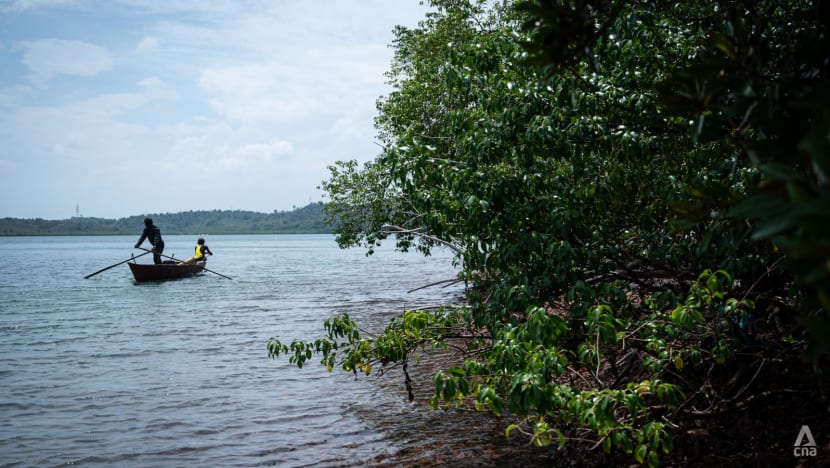
Mr Hasan confirmed this. Years ago, it was common for Orang Laut to haul in tens of kilograms of squid after one night of fishing.
“But now, it is hard to get that same amount. We can only get three or four kilos (of squid) a night,” he said. “The same with fish. Before, we could catch five or even six red groupers. But now, only one and at times, not at all.”
FORCED TO SETTLE DOWN
Mr Leo Putra, chief of the Batam Social Affairs and Community Empowerment Agency said to mitigate the effects of climate change, his office is providing Orang Laut with outboard motors so they can sail faster and fish further.
The government is also providing training for the nomads to start their own fish farms and handing out sewing machines so the women can supplement their families’ income by becoming tailors.
In return, the office requested Orang Laut to give up their nomadic lifestyle. “If they move around so much, it will be difficult for us to help them,” Mr Leo told CNA.
The government has been trying to get the group to settle in a particular island or coastal area since the 1990s, under the notion that their nomadic way of life is backwards and primitive.
“Their children didn’t go to school. They had no identity cards. They had no religion. So we gave them houses, we built schools for their children and sent preachers and missionaries to convert them,” the agency chief said.
The programme was successful in getting virtually all Orang Laut in and around Batam to live on stilt houses in around 40 locations around the city. Unlike their parents, children know how to read and write while the adults have access to healthcare and social assistance schemes.
But it also caused a dramatic shift in their culture and tradition.
In Batam, there are several Orang Laut communities which have become completely sedentary. In these communities, their traditional rowboats - the only thing that separates them from ordinary fishermen - exist only in the memories of ageing men and women.
For those who still practise semi-nomadic lives, they build only small “child” rowboats and not the big and bulky “mother” boats that their parents used to have.
“Smaller boats are more manoeuvrable and we don’t need boats which can fit a whole family like before,” said Madam Sarina, 55. She added that nowadays in her community on the western coast of Batam, only the men embark on months-long sea journeys while the women and children stay behind.
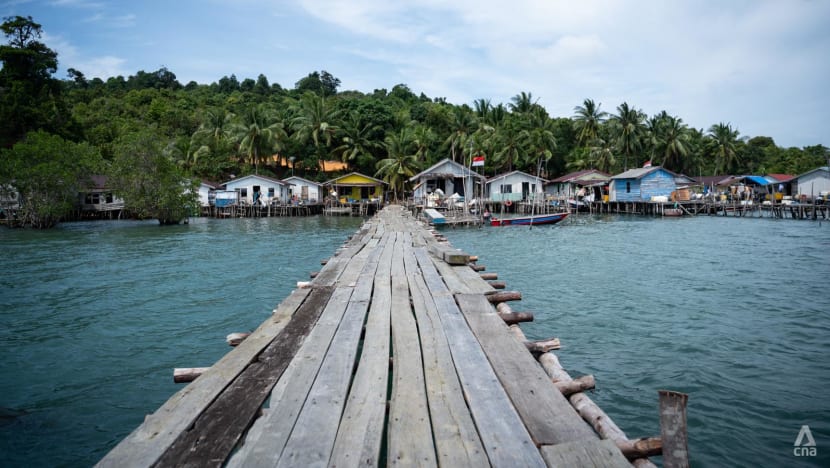
IS THIS THE END?
Mr Hasan of Tanjung Sauh Island said life is becoming increasingly hard for Orang Laut in his community. The waters near his island are unsuitable for fish farming as they are polluted and muddy from nearby factories and the busy shipping lane.
The only options are to fish at night when there are fewer ferries and barges sailing through or venture dozens of kilometres away to the chain of islands southwest of Bintan where the waters are clearer.
But these two options are becoming unfeasible due to climate change.
“When it’s windy like this, it is hard to even circumnavigate this island,” he said.
As life at sea continues to become harder, particularly during periods of rough seas and high winds, the Orang Laut of Tanjung Sauh have turned to land in search of work.
For the past five years, several of them have become part-time rubbish pickers at a landfill some 7km away in Batam’s main island.
At the landfill, these men and women sift through the mountain of rubbish looking for items they can sell to a recycling plant as well as discarded clothes and toys they can bring home with them.
“We have no education or experience on land. This is the only work we can find,” 40-year-old Madam Saikim told CNA.
Mr Hasan said he is worried that one day the sea will no longer become a hospitable and reliable source of livelihood for family.
“We already had two people who have given up working as fishermen and now work as security guards on land,” he said. “I want my kids to go to school and find work on land because living off the sea seems to be getting harder each year.”
Mr Saiyun echoed the sentiment, saying that he also wishes his three grandchildren will not become fishermen like himself or their parents.
“It is up to them if they want changes and wealth. I cannot tell them ‘no’ if they decide to work on land. It is up to them,” he said.
When asked whether he is worried that the traditions of Orang Laut will fade away and be forgotten if everyone decides to work on land, he paused and briefly closed his eyes.
After taking a deep breath, he replied with a wide, bitter grin: “If they can preserve (the tradition) that’s great. But if it’s meant to be, it’s meant to be."
